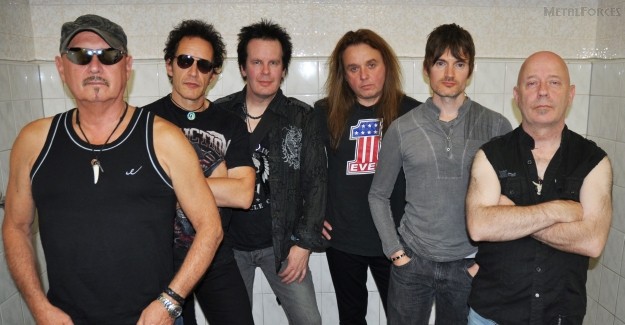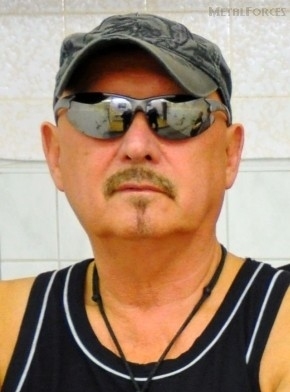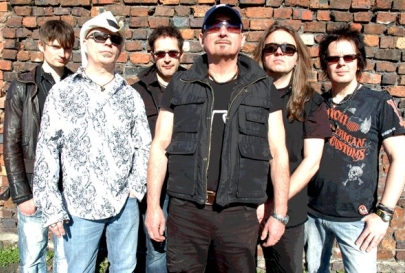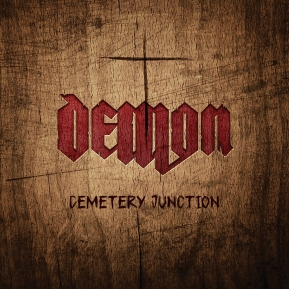
DEMON – Turning On The Magic
Anthony Morgan
October 2016

|
![]()
Midlands, England-based hard rock / heavy metal outfit Demon began authoring compositions in earnest for October 2016 full-length Cemetery Junction – their 13th, overall – during 2012-13. Demon subsequently assembled as a unit, and began penning ideas in support of the effort. Previous jaunt Unbroken had arrived in September 2012, shortly prior to said writing sessions.
“It sort of progressed from there until eventually we felt we got the type of album we wanted to do,” remembers Dave Hill, vocalist of Demon. “In the same way we’ve always worked with the band over the years, we felt good with what we got and took it a stage further. We took it to the studio, and eventually came out and produced Cemetery Junction.”
Sessions which developed Cemetery Junction were typical in nature. “Yeah,” the singer confirms. “I think over the years, we… I think it is varied. I mean, obviously Demon has been going… What?… It must be about 35 years or so (laughs). It’s changed a little bit over the years, but we get a particular idea that we want to do. I mean, I think every album we’ve ever done has been slightly different than the one before. We start with an idea… I would always have a pad full of ideas over the years, lyric wise. I would work on them one day, and then I’d get together with the guitar player (Paul Hume) or the drummer (Neil Ogden) in this case – on the new album – certain ideas would crop up. Then lyrics would come out of the book and we would bring to life that particular subject, but that tends to be the way that we work.”
Cemetery Junction will inevitably be critiqued against previous Demon affairs. “The thing is, over the years we’ve done every sort of thing,” Dave submits. “As I say, we’ve never done the same album twice. The reaction I’ve had with the interviews and speaking to the various press in Europe and here… We’ve got some great feedback, and we’ve had quotes like ‘It is probably as good as Demon has done in the past’ and ‘It is probably as good an album as Demon has ever made.’ I think when you’ve been going as long as we have, if you get to the stage where…
“If you’re going to continue for all of these years, it’s pointless doing a filler album or an in-between album. Each time that we work on something, I try to think ‘This may be the best thing we’ve ever done,’ but the nice thing at the moment is the feedback. It was only released on the weekend, but in lots of interviews I have done, people are tending to say it’s probably as good as we’ve done in the past. So for me, that’s a pretty good response.”
A conglomerate of past Demon ingredients form Cemetery Junction, the frontman views. “For people who know the band, it’s a combination,” he shares. “We’ve used virtually everything from the early days of Night Of The Demon (June 1981) and The Unexpected Guest (July 1982) through to Taking The World By Storm (June 1989). We’ve always wanted to take on modern sort of music and move the subject forward, but I think it’s a combination. I did an interview the other day with some German publication; I asked them what they thought of the album, and they said ‘It’s a combination of early Demon classics, and a mixture of everything you’ve ever done under one roof.’ I think that’s it. We’ve always liked to use extensive, sort of modern sounds, like keyboards. We’ve not been frightened to maybe…
“We’ve moved on from the early days, but we’ll mention the New Wave Of British Heavy Metal. That is 36-37 years ago, though. I keep being reminded that’s where we came from. I think that’s good, but you need to move on and we always have. I didn’t ever want to make the same album like 13 times. Maybe if we had sold five million of the first album, then you make the same album 13 times (laughs). I don’t know, because that’s what finance is all about. As far as I am concerned though, I buy an album. I still do today, and I hope that with the band I’ve bought the album from – going back to the days of Pink Floyd, or whomever it be – you get something different each time. That’s where I come from.
“I think with the Demon thing, that’s what we’ve always tried to do, regardless of financial gain. If you get that, that’s wonderful, but I think if it always comes from the heart with each album that you do… It’s a combination of everything that we’ve done in the past. I try to make each album as commercial as possible, and accessible, and to use all of the modern sounds and maybe deliver an album for the fans and the people out there. It’s what we should be doing after all of these years.”

|
Both differences and similarities exist between 2016’s Demon and 1980s-era Demon. “We were a lot younger,” Dave quips, laughing. “With any band… Because I’m a lover of music, anyway… The great thing you find probably in the career of a band is they have this rawness in the early days, and I think it’s nice to keep that as you move on. Demon 30-odd years ago with Night Of The Demon and so on, though… If I had thought that when we did Night Of The Demon, anyone would’ve remembered it maybe even a couple of years later, I would’ve been surprised. 30-odd years down the line though, when we play obviously, we play tracks from the early albums. Of course we do, because that’s what we’re all about, but I think we’ve kept the spirit of the music. That’s what it was all about.
“We’ve moved through and used the different sounds and techniques of the day, but I think it’s basically keeping the spirit. I think the spirit we started out with, to me, has to be the same all these years later. We’re all a lot older, but I think the fire in your belly and the spirit of wanting to still make the music has to be the same as Night Of The Demon and The Unexpected Guest or whatever. Because you get older, you mature and you move on, but I think deep down inside… Particularly myself, I still feel the want to make a good product and the want to go out and play onstage as good as we ever did. I think if you lose that, that’s the time to call it a day.”
Some harbour ambivalent views towards the New Wave Of British Heavy Metal tag, which the likes of Night Of The Demon was filed under. “I had no problems with the New Wave Of British Heavy Metal,” the mainman underlines. “Everyone has to come from somewhere, and we were a part of that movement. I’ve played many years, especially abroad, in Germany, Sweden, or wherever it may be. There have been a lot of New Wave Of British Heavy Metal get togethers, and the only downside for me…
“Not recently, but years ago, a lot of bands that were pulled together were only around for a couple of years, and then they got a different line-up years later. Maybe then they played a New Wave Of British Heavy Metal festival in Sweden, or in Italy, or somewhere. I just sometimes think that it was sold short, but I think these days, there’s a great, healthy respect for the movement. I appreciate that that’s where we came from; every band has to start somewhere, and they were good days. They were raw days, and there was a change in the music industry.
“I still have a healthy respect for that, but as far as Demon goes, we never packed in. We’ve continued to play and record for the last 30 or so years, so that was our legacy. That’s where we came from, and every so often… I think we’re doing one in Sheffield in December (December 2nd-3rd), which once again is a New Wave Of British Heavy Metal get together. And yeah, I’m all for that, as long as it’s respectful. That’s where we came from, and that’s where a lot of bands came from. I don’t like it sold short. I don’t like it to be a cheapened version of something that everybody did, but yeah, that’s where we came from.”
Demon has soldiered on since 1979 save for a five-year hiatus between 1992 and 1997, whereas many other assortments of the New Wave Of British Heavy Metal ilk were short-lived. “I think with us, we obviously came through that early 80s period,” Dave muses. “Once the New Wave Of British Heavy Metal had become established and bands like Iron Maiden and Saxon and Def Leppard and co. became the bigger bands of the period, a lot of bands tended to fall by the wayside. I think what we tended to do is…
“We did the first two, maybe three albums which did very well for us and did well in Europe, so early-to-mid 80s, we got out there and started to play in places like Germany and central Europe, and I think that that kept us going. We signed to one or two distribution companies in Europe, and even America. We moved on, so we made albums that didn’t cost a fortune. They didn’t sell millions, but they sold enough so that the companies were happy that they made some money and people wanted another album from us. I think we wanted to just keep it going.
“I always thought that, as I said earlier, the next album will be better than the one before. So, we marched off to Europe and we played quite a lot of tours, and they were very good. I think that that kept the band going, because there was an enthusiasm. Even though there has always been a strong fanbase in Britain, it was a matter of believing in what we did and moving on at the time. Obviously, after the New Wave Of British Heavy Metal came the Bon Jovis, came the thrash and everything else, which was great because that’s how music progresses. Maybe a lot of bands from that period fell by the wayside, but we just decided to kick on and go to territories where we had done quite well. It kept us going, and gave us the enthusiasm to want to keep making the music.”
Cemetery Junction pursues a wide array of lyrical themes. “Over the years, we’ve always been sort of fairly involved in the lyrical ideas that we do,” the composer discloses. “With Cemetery Junction, the whole idea of it… Funnily enough, there’s been a film – as you probably know – called Cemetery Junction (2010), which was a place in Reading which basically has nothing really to do with the Demon album. There is in the town where I live… I live in a place called Leek, which is near Stoke-On-Trent. I’ve just been listening to the football; Stoke have won tonight (3-1, versus Swansea City), and that was good. It has nothing to do with the conversation, but in Leek there is a cemetery at Junction Road. So, in a roundabout way, we’ve tended to use the term Cemetery Junction. It’s something that I’ve been familiar with on a local level. Anyway, that’s the title. As I say though, it’s nothing to do with the film.
“The opening title, ‘Are You Just Like Me?’, is a basic rock song really which references the beginnings of man to modern day man. Man’s the same but has progressed, so in practice you’ve got the spirit of man. The second track, if I remember, is ‘Life In Berlin’. I’ve had some fun with the interviews with the Germans, because they have asked ‘Why did you call it ‘Life In Berlin’? Why didn’t you call it ‘Life In Stuttgart’, or ‘Life In Hamburg’?’ I said ‘Well, it doesn’t sing very well.’ They have got a sense of humour anyway, the Germans (laughs). That was just a song that we were working on in the studio though, and ‘Life In Berlin’ seemed to sing really good. I’ve been there many times and played, so basically that worked out.

|
“With the track ‘The Best Is Yet To Come’, for me, I was always a fan of the Mad Max films, so I just wanted to do something that could be like the soundtrack for the next Mad Max film. It never will be, because they will never ask us. Basically, it’s all about strange characters, which is what the Mad Max films are like. Then I saw the new one (Mad Max: Fury Road, 2015), which I really liked. Basically, it’s orchestrated – that was the idea. I spoke with the keyboard player, and said ‘Let’s do some big orchestration on this, as though it’s the soundtrack for the new Mad Max.’
“There’s ‘Queen Of Hollywood’, and I think that speaks for itself; there’s people trying to make it various cities, be it Hollywood or London. It’s a track that we had knocking around for quite some time. There’s also the track ‘Out Of Control’ on the album. The idea came from a Batman film from about eight years ago (The Dark Knight); there was a Batman film where he became quite modern. He was on the streets of Gotham or wherever it was and I thought ‘I quite like this,’ so we did something. It’s not a Batman thing, but is obviously another big production-type track and theme.
“With ‘Someone’s Watching You’, the last track, there has been a lot of interest in the interviews that I’ve done. It’s probably like Night Of The Demon, but 37 years later. It’s a bit more orchestrated. You’re sitting in a room, it’s Halloween, and someone puts their hand on your shoulder (laughs). It’s a semi-horror type of thing. If you listen to the lyrics, it’s a throwback to that period of Night Of The Demon. There’s everything on the album. For me, every track has to have some sort of theme. I’m not a great writer of love songs. Some of the best writers in the world write love songs, so I always like themes or ideas. Once again, Night Of The Demon has themes or ideas and messages and so on, and then we would try to bring them to life in the best possible way.”
Cemetery Junction’s recording was particularly aided by a specific member of the Demon camp. “One of the guys in the band, Paul Hume (guitars), has a studio close to where we live in Stoke,” Dave informs. “So, we recorded most of the most ideas and the actual recording down there, and then we mixed the album. We mixed the album in Rochdale, like we did with the last album, Unbroken. In fact, it’s a studio owned by Lisa Stansfield, of all people. The engineer had some free time up there. It’s an excellent mixing place, in Rochdale, so we went up there when we finished recording locally with Paul the guitar player. We decided we wanted to go up there and mix the album. It’s a place called Gracieland and as I say, it’s owned by Lisa Stansfield. The engineer is a big fan of ours and has worked there for some years, so we got a very nice deal, and it’s a nice studio for mixing. We ended up getting the sounds. It suited us, I think.
“Many bands tend to use places they’re comfortable in, and we were comfortable recording the material at Paul’s locally. Then obviously we needed somewhere to mix, though. We used the mixing suite up in Rochdale, and we’re quite happy about that. We’ve had quite a few comments about the fact that Cemetery Junction sounds like a well-produced album. So, at the end of the day, after 30-odd years, you’ve got to be able to still produce quite a good-sounding album. Yeah though, we’re pleased with the studios and the mixing place as well.”
In addition, Cemetery Junction benefited from the services of manager Mike Stone. “Mike Stone I’ve worked with for some 30-odd years, from the days of Clay Records,” the lyricist divulges. “When I first met him, he was producing punk bands like Discharge and GBH, and legendary people like that (laughs). He had Clay Records, the label. He came up to Stoke, and opened this label. I had no idea who Mike Stone was and Clay Records, but we became friends, and from there we did the first Demon single. That was ‘Liar’, which was like a blood-red single, and then we obviously moved on. We were with Carrere, who had Saxon and so on. Most of the time we write the material though, and go to the studio to record it.
“Then come the mixing stage, Mike comes in, who’s managed us for all those years since… Well, co-managed the band with myself… And we do produce the albums ourselves. Obviously, I suppose if we were with EMI and people like that… Whether they still exist, I don’t know, but companies like that would probably have the top producers. With the budgets we have and that, we work it that way, and then we go in with Mike and ourselves. He is very good on the mixing side because he’s not familiar with the material, so he can be quite creative. We tend to work that way, and once again, we’re very happy with the sound, the result, and the sort of mix at the end of the day.”

|
Albeit a band effort, Demon is arguably spearheaded by Dave given his longevity within the fold. “That’s because I remained there from day one,” he chuckles. “It’s not something I wanted to happen, but because I’ve always believed and stayed with it. We’ve got guys in there that have been with us for quite a few years. I think people would associate Demon with me, like Biff (Byford, vocals) with Saxon or whatever it be, because the people that have been there from the beginning are those that people associate with bands. It takes everybody in the band; talented people that we’ve worked with over the years, and the crew that we have at the moment.
“Yeah though, obviously wherever we go, people will revert to the albums. So, obviously they’re going to reference myself because I’ve been on them or co-written them. It does take a great effort from the band itself to get the material and to keep the sound and the band’s heritage going, which I appreciate and am pleased with. I tend to be a figurehead not because of choice. I prefer it the other way, but they will refer to me because I sang on Night Of The Demon and I sang on the new album. That’s life and I have no problem with that, although it’s a great band contribution wherever we play and whatever we record.”
35 years separate Night Of The Demon and Cemetery Junction, both platters boasting the performer’s vocals – which the man himself referenced. “Well, my vocals are still holding out,” he laughs. “I think vocally, what you’ve got to do over the years is… I think your ears are as bad as your voice, because my ears have taken some pounding over the years. Vocal-wise, yeah, I feel quite good. I’ve bumped into a lot of people at festivals at one place or another. I’m not gonna mention names, but there are quite famous people who do struggle these days, and they’ve had to tune down quite a lot. They’ve given it all for 30-40 years though, so I think your voice takes a pounding. I don’t smoke, but I do like a drink. I realise that over the years, when you’re getting old, your voice will suffer a little bit, but at the moment I feel quite good about the record – there were no problems.
“On the live work, yeah, it’s pretty good, but it’s not gonna last forever. We’re all knocking on, but vocals, yeah. I still love to do the vocals, and I still have no problem with the range. I think you’ve just got to take care of it. We all abuse things over the years, but at the end of the day, if you’re gonna make records and still hopefully better the one you did before, then you have to have some sort of… I tend to live quite healthy; I do exercise and I go cycling, and one thing or another. Basically, hopefully I’ll just keep the voice going, and keep going as long as we can.”
A simplistic affair, Cemetery Junction’s cover artwork sports a cross. “I quite like the cover,” Dave enthuses. “You can go mad with something like Cemetery Junction; you can either have Night Of The Demon again with two hands coming out at the front, or this, that, and the other. I like it, because it’s simple. The album is quite extensive. It’s quite explicit, as you know, and there’s 11 tracks, but I quite like the simplicity of saying ‘That’s the cover’. It’s quite simple. For me, the more that I look at it… Years ago, I had a record shop in my town, and I always remember when I used to order new albums. I would open the box, and I’d look down at the album cover. I knew the ones that I would remember next time, no matter how flamboyant or simple. I would pull them all out and look at them, and then the next time I saw the album, I would think ‘Yeah, I remember that one.’
“For me, it’s simple but it’s quite memorable. It says it simply, but then you’ve got to put the music on, and the music’s quite big. We’ve had some quite astounding covers over the years, but this one I like. It just says Cemetery Junction, but the cross… I’m glad you noticed that, because I noticed it. I said to Mike Stone the manager. He sent me the image, and I said ‘I like the little cross above it.’ He said ‘Ah… You’ve seen that, have you?’ I’m glad you’ve noticed, because I like that. Although it’s simple, it’s maybe a bit tombstone-y in a way.”
Cemetery Junction was released on October 28th, 2016 via Spaced Out Music.
Interview published in October 2016.
Related Posts via Categories
- SCOTTISH SICKNESS – A Report On The Scottish Death Metal Scene, Featuring BRAINBATH, PUTRID FATE And RANCID CADAVER (October 2022) | Features / Interviews @ Metal Forces
- LARVAE – Join The Hardcore Cult! (June 2022) | Features / Interviews @ Metal Forces Magazine
- TRENCH FOOT – Sacrificing Morals For Gory Obscenities (June 2022) | Features / Interviews @ Metal Forces Magazine
- L.A. GUNS – Trigger Happy (March 2019) | Features / Interviews @ Metal Forces Magazine
- CANCER – Crimes So Evil (November 2018) | Features / Interviews @ Metal Forces Magazine
- U.D.O. – The Tank Drives On (August 2018) | Features / Interviews @ Metal Forces Magazine
- SIEGE OF POWER – Bleeding For The Cause (August 2018) | Features / Interviews @ Metal Forces Magazine
- MOONSPELL – A Taste Of Live Eternity (August 2018) | Features / Interviews @ Metal Forces Magazine
- MONSTROSITY – Dark Matter Invocation (August 2018) | Features / Interviews @ Metal Forces Magazine
- SATAN – Five Magicians (August 2018) | Features / Interviews @ Metal Forces Magazine
|
|





